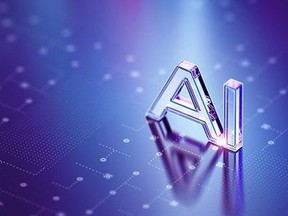Breadcrumb Trail Links
Instead of taking over, AI is acting as a helpful assistant, making the job of a programmer faster and easier.
Author of the article:
Tim Philp • For the Expositor
Published Sep 12, 2025 • Last updated 23 hours ago • 3 minute read
 Getty ImagesArticle content
Getty ImagesArticle content
I have recently been working on a database programming application and have, for the first time, used artificial intelligence (AI) to help with the programming.
Advertisement 2
This advertisement has not loaded yet, but your article continues below.
Article content
If my experience is any judge, the world of computing is about to undergo a sea-change in the way our programs are created.
Article content
Recommended Videos
Article content
Instead of taking over, AI is acting as a helpful assistant, making the job of a programmer faster and easier.
Think of it like a smart co-pilot that can watch what a programmer is doing and then suggest the next line of code or even write whole parts of a program based on a simple instruction.
For example, a programmer can type a sentence like “create a button that saves user information,” and the AI can instantly write the code needed to do just that. This is a massive change from the old way of doing things, where every single line of code had to be written by hand.
The benefits for programmers are huge. For one, AI dramatically speeds up the process by taking over the boring, repetitive tasks. This is like having a robot build the basic frame of a house while the builder focuses on the more important parts, like the unique design and interior layout. This frees up the programmer’s time to focus on the more interesting and challenging parts of their job, such as creating new features or solving complex problems.
Advertisement 3
This advertisement has not loaded yet, but your article continues below.
Article content
AI also helps catch mistakes. It can quickly scan through code and find errors or security weaknesses that a human might miss.
For those just starting out in programming, AI can be a great teacher, offering suggestions and examples that help them learn much faster. In essence, it makes creating software more accessible to more people.
AI is even good at analysing code or the output of a program for errors. Should a bug appear in the program, sometimes describing the bug, or showing the output of the faulty code is enough to allow the AI to find the problem and fix it.
In the experience that I have had working with AI as a programming tool; it is capable of finding extremely subtle errors in the code that might have taken days for me to find. This promises to speed up the development of computer programs tremendously.
Advertisement 4
This advertisement has not loaded yet, but your article continues below.
Article content
As AI becomes more advanced, the future of programming will look different. The job of a programmer won’t be about writing every line of code from scratch. Instead, they will become more like a director, telling the AI what they want the program to do.
Their focus will shift from the small details of code to the big picture — designing how a program works and what it should accomplish. This is already happening with “no-code” and “low-code” platforms, where people can build applications by dragging and dropping elements instead of writing code.
Even with all this AI help, the human programmer remains vital. AI can’t invent new ideas, understand complex business goals, or make ethical judgments on its own… at least, not yet. It’s up to the programmer to check the AI’s work, make sure the program is secure, and guide the AI to solve problems in new and creative ways.
The relationship between a programmer and AI will become a team effort, where the AI handles the routine tasks and the human provides the creativity, strategy, and critical thinking.
The future of programming isn’t about people being replaced, but about being empowered to do more and achieve their goals faster.
Tim Philp has enjoyed science since he was old enough to read. Having worked in technical fields all his life, he shares his love of science with readers. He can be reached by e-mail at tphilp@bfree.on.ca
Article content
Share this article in your social network
